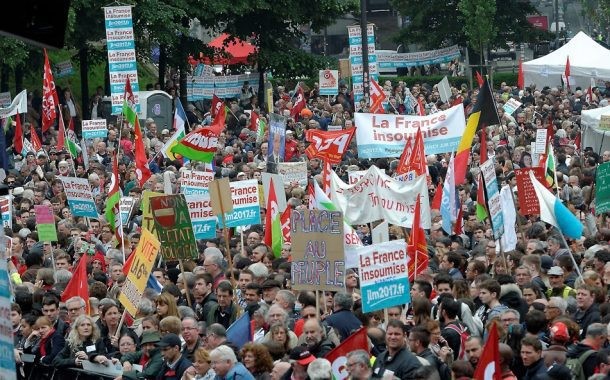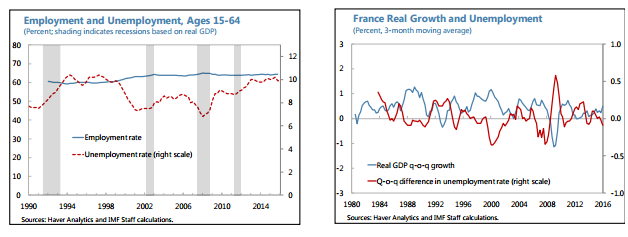France Revisited: Delights and Social Heartbreaks

Denis Bright provides a multi-dimensional analysis of Contemporary France. Is this largest country in the European Union with its population approaching 67 million, an appropriate model for other middle-sized economies like Australia?
France continues to be the most acclaimed destination for Australian tourists to Europe. Numbers may be down slightly but the influx of Australians will run to more than 150,000 in 2016. Holiday mishaps aside, most stays in Paris and provincial France are a delightful escape from the routines of work or retirement.
Some Australian visitors choose to balance this euphoria with visits to the former battle fields of the Western Front. For 46,000 Australians during the Great War, the tour of duty was permanent. Over 181,000 Australian volunteers were often scarred for life from physical injuries and psychological wounds.
Anticipating the current terrorist alerts across France, some tourists from Australia might be surprised by the passionate French political involvement with issues that are quite familiar back home. This might be expected as both countries are developed mixed economies that are striving to cope with new trends in globalization. The economies share the ideological templates for successful market economies as espoused by IMF President and former Sarkozy Minister Christine Lagarde.
President Sarkozy (2007-12) attempted to bring France closer to the neoliberal development model but was defeated by a majority socialist government under President Hollande. There was no need to offer cabinet positions to deputies from left and ecological parties as the incoming government had a clear majority in the Chamber of Deputies.
Inheriting a stagnant economy from President Sarkozy, President Hollande’s government has been receptive to neoliberal template for recovery from the Global Financial Crisis (GFC).
However, this once inclusive mixed economy finds it difficult to fit in with the IMF’s neoliberal template. Nevertheless France remains the world’s sixth largest economy in IMF data for 2016, which is surprisingly just more than twice the GDP of the Australian economy.
As in Australia, the income divide in French society has been increased by application of market ideology within globalization. It is still modest by world standards compared with the US.
Signs of this income divide in France emerged in ongoing riots in disadvantaged suburbs on a massive scale under President Sarkozy’s administration (2007-12).
More recent localized unrest is unrelated to global terrorist threats.
At Viry-Chatillon, an outer southern suburb of Paris, a police patrol was fire-bombed on 8 October 2016. Four police officers were injured in the incident.
Under wider siege from both a stagnant national economy and the challenge from armed terrorism, the Socialist government of President Hollande has moved to the right in both domestic and foreign policies. A real challenge to the longevity of President Hollande’s government has emerged from the National Front and Sarkozy’s Republicans (UMP).
If current opinion polls are reliable, the ruling Socialist Party (PS) will lose its absolute majority in the Chamber of Deputies in 2017. Some of the remnants of the Centre-Left vote will drift to minor parties such as the Greens, Left Front, New Centre and the Radical Party of the Left with nominal representation in the Chamber of Deputies.
In the final presidential run-off, either Nicholas Sazkozy or Alaine Juppe will emerge victorious. Both of the right candidates have a record of political confrontation over the implementation of budget repair strategies and labour laws.
Francois Hollande’s own administration has already sparked this style of confrontation over similar issues. However, the Socialist Government recently offered some palliatives. New rolling stock orders to Alstom Transport have just prevented the closure of its commercial workshops in Beaufort, Paris pending more international orders for capital equipment.
Commitment to a more flexible labour-market has stirred the passions of the key support base for the PS Government with ongoing demonstrations across France. A synopsis of the consequences of reforms to French labour laws is well summarised by BBC News Online:
- The 35-hour week remains in place, but as an average. Firms can negotiate with local trade unions on more or fewer hours from week to week, up to a maximum of 46 hours.
- Firms are given greater freedom to reduce pay.
- The law eases conditions for laying off workers, which is strongly regulated in France. It is hoped companies will take on more people if they know they can shed jobs in case of a downturn.
- Employers to get more leeway to negotiate holidays and special leave, such as maternity or for getting married. These are currently also heavily regulated.
For President Sarkozy, or even Alan Juppe as potential come-back conservative leaders, France will be impossible to manage through an attempted repeat application of the IMF rule-book.
Opposition to the US-sponsored Transatlantic Trade and Investment Agreement (TTIP) permeates the whole political spectrum in France. It is at odds with efforts to internationalise France’s own trade and investment outreach which have achieved some positive traction since the election of Hollande.
Sarkozy’s France (2007-12) was a victim of the Global Financial Crisis (GFC). Budget deficits in 2009-10 were twice the levels currently prevailing under Francois Hollande.
Real economic growth has picked up from +0.2 per cent in 2012 to +1.6 per cent in 2016. This leaves overall French unemployment rates at over 10 per cent and youth unemployment at around 25 per cent.

Signs of economic stagnation in France? (IMF Online July 2016)
Amongst French-people of African or Arabic origins, the situation is dire:
In the suburbs of Paris, where millions of first- and second-generation Arab and African immigrants live, unemployment is over 50 percent. A paper from the Migration Policy Institute concluded that even after a decade of living in France, immigrants are still highly vulnerable on the labor market because of ongoing discrimination and the lack of resources to help them integrate into society.
Al Jazeera Online 14 January 2015
In a surprise move on 8 October 2016, the Hollande Government announced the re-formation of a national guard to combat the ongoing national terrorist threat.
The Guard is expected to reach 84,000 people by 2018 and will relieve traditional security forces. France’s police and military have been stretched following a series of devastating terror attacks across the country in the last two years.
The French National Guard will not be a completely new initiative. Rather, it will bring together personnel from the police, gendarmerie and armed forces under the National Guard umbrella – currently totalling around 63,000 reservists.
The decree also borrows from the US National Guard as it aims to encourage citizens to get involved and serve their country. A dedicated government-backed website hopes to win over a number of new volunteers (DW Online 12 October 2016).
Commitment to domestic security has been reinforced by a more proactive French role in NATO and a boom in its high technology arms sales internationally. France has become the major supplier of arms from Western Europe.

Independent Online (http://www.independent.co.uk/news/business/news/arms-trade-exporters-importers-weapons)
Australian tourists of all persuasions arrive home refreshed and laden with shopping souvenirs and holiday memories. The more tarnished brand of France Politique is no longer a viable exportable item.
The realities of power invite new challenges from the right and the left but a real lack of inspiration from the bland centre. France is not the only country to be in this pickle. Electorates across the world are wanting to hit the reset button to redefine a more convivial form of mainstream globalization. This is more in-keeping with the holiday mood of the seemingly endless battalions of Australian visitors to France and the wider European Union.
 Denis Bright (pictured) is a registered teacher and a member of the Media, Entertainment and Arts Alliance (MEAA). Denis has recent postgraduate qualifications in journalism, public policy and international relations. He is interested in developing pragmatic public policies based on commitment to a social market that is highly compatible with currently fluid trends in contemporary globalization.
Denis Bright (pictured) is a registered teacher and a member of the Media, Entertainment and Arts Alliance (MEAA). Denis has recent postgraduate qualifications in journalism, public policy and international relations. He is interested in developing pragmatic public policies based on commitment to a social market that is highly compatible with currently fluid trends in contemporary globalization.









17 comments
Login here Register here-
mark -
Theresa -
Patrick -
Paul -
Paul -
Rubio@Coast -
Paul -
Lalnama -
Catherine -
John Kelly -
Harquebus -
wam -
Denis Bright in Brisbane -
Passport to New Left France -
Maria -
Kyaw Wai Yan Min -
Mary
Return to home pageJust don’t eat the snails.mark
Thanks Denis, an interesting insight into the French economy. Many found memories as of holidays in France!
Informative article, it’s important to be aware of what is going on behind the scenes when you travel abroad.
A great article, which opens the window to the otherside of France beyond the Tour de efile, Louvre and Notre Dame.
A wonderful country with wonderful people from all walks of life and cultures.
There are lots of tensions internally within in France as people’s expectations are not being met by reality – it’s a difficult thing to mange and the future government will have a difficult challenge getting the balance right.
Great article!
It opens another window to Paris looking out beyond the tour de Eiffel, Notre Dame et Le Louvre.
France is a beautiful country with wonderful people from many backgrounds. Lots of challenges ahead though they can be overcome with a balanced approach and hope.
Thanks Mark. I don’t do snails. Eyewitness news coverage of France is just as bad. It gives tele watchers the idea that they are well informed. This article covers aspects of France that are not really covered in detail by news services like the potential impact of the US-EU Trade Agreements.
Great article! Opens another window to Paris looking out beyond the Tour de Eiffel, Notre Dame et Le Louvre.
France is beautiful country with a beautiful mix of people and cultures. Unfortunately, like other Southern European countries, expectations are not meeting reality and this results in tension and poor decision making.
Lots of challenges ahead but I have hope.
Good insight into the state of France today. High unemployment levels especially with such high youth unemployed will continue to raise levels of social unrest.
As someone who loves to wander around the villages of France it is interesting to read about the economics and social pressures that are at play behind the scenes. For me France will always be one of my top places to visit.
World GDP rankings place France 6th and Australia either 12th or 13th depending which compilation you accept. https://en.m.wikipedia.org/wiki/List_of_countries_by_GDP_(nominal)
One of my favourite places to visit. Il est réconfortant pour l’esprit, n’est-il pas ?
“The Paris you know or remember from adverts or brochures no longer exists.”
https://www.youtube.com/watch?v=Ek1ENuEyWHE
mulwala, benalla et spyraena novahollandiae sont reconfortant pour la guerre???
ps beauty Harquebus
the ‘paris syndrome’ affects the japanese and others.
but, like john, I have no illusions and, despite my accent ‘vache espagnol’, enjoy visiting france.
“Nevertheless France remains the world’s sixth largest economy in IMF data for 2016, which is surprisingly just more than twice the GDP of the Australian economy”.
Sorry my missing word typo did make a difference and it was not picked up on my spell-check.
Apologies to the French for talking up the size of the Australian economy. In nominal GDP (IMF Listings 2016): Australia is $US1.3 trillion and France $2.5 trillion.and the EU $16.5 trillion with the US $18.6 trillion and China $11.4 trillion. Purchasing Power Parity (PPP GDP) produces a different set of numbers.
France is always a symbol of progressive social democracy. The Left may survive in France next year. The optimum outcome would be a Socialist Government with the support from the various Left and Green Parties as part of an inclusive New Left Government.
As the article mentions, this seems unlikely. Republican Leaders like Sarkozy and Juppe batting for the Transatlantic Trade and Investment Partnership (TTIP).
All this might change quickly in a global economy where the instability along the lines of the GFC which caught out some greedy French banking institutions.
The French left must keep up the struggle and gain ground from Hollande without defeating the government but gaining new influence for change.
Excellent article Denis, I enjoyed learning about the political and economic aspects of France. A country I have enjoyed visiting many times.
Good article 🙂 very interesting
Good article – very informative as always!